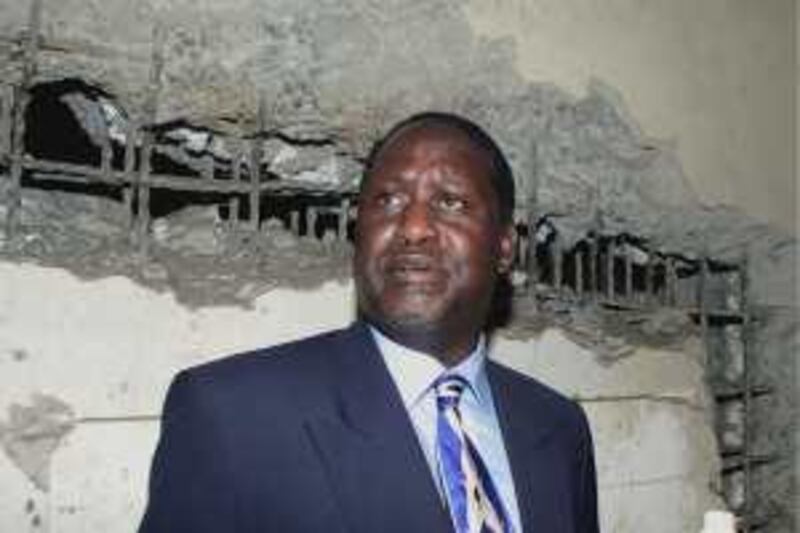NAIROBI // Most foreigners living in Nairobi know Nyayo House as the place to renew a visa or take care of an immigration problem. But not long ago, in the basement of the faded yellow 26-storey office building, horrible things happened. In the late 1980s and 1990s, dozens of political prisoners were tortured in a notorious prison below Nyayo House. Some died from their ordeal. The tortures took place under Daniel arap Moi, the former president who ruled with an increasingly heavy hand towards the end of his regime.
When the current government took power in 2003, victims of the torture chambers were promised compensation. Courts awarded thousands of dollars in damages to the former prisoners. But the government has yet to pay any compensation, even after the latest ruling, which demanded swift action. A group representing the victims last week called for the resignation of Amos Wako, the attorney general, who has blocked the payments. He is under fire as the head of a justice system many people see as corrupt and in need of reform. Kenyans want the government to pay the torture victims so the country can move on from this dark chapter.
Last year, a court ruled that seven of the victims should be compensated US$20,000 (Dh73,600) each. Another two dozen cases are pending. The government has repeatedly stalled in issuing the payments. A court order last month forcing the attorney general to pay up was met with indifference, and the victims have threatened to sue him directly. "What pains us is that the attorney general has disobeyed court orders to pay deserving Nyayo House torture victims, while spending money on luxury projects," said Rumba Kinuthia, a lawyer representing the victims. "We have given the government notice that contempt proceedings shall be instituted."
Hundreds of political prisoners were believed to have been tortured in the Nyayo House cells and as many as 40 died. Many victims were suspected members of Mwakenya, an underground movement of activists opposed to Mr Moi's rule. The prisoners were held for weeks without being charged in dank, cramped cells. In the book, We lived to tell: The Nyayo House Story, ex-prisoners detail the conditions of the torture chambers.
Detainees were stripped and sprayed with cold water. Their cells were flooded with knee-deep water and they were given little food; some were beaten daily for hours with sticks and burnt with cigarette ends. Some finally confessed to trumped-up charges of sedition and were quickly convicted and locked away in maximum security prisons. In the book, Nganga Thiongo, a Nairobi lawyer, described his torture at Nyayo House. "My screams did not help as they continued brutalising me," he said. "They were insisting that I confess all that I knew or they would kill me. After collapsing due to exhaustion, I was returned to the basement cells. The guards were instructed to continue with the beatings. The beatings continued relentlessly and only the methods varied."
Njeru Kathangu, a former member of parliament who was tortured in Nyayo House, said interrogators tried to make him confess and the questions were politically charged. "They challenged me saying that I was involved in covert activities intending to overthrow the government," he said in the book. "I denied being the architect of Saba Saba [a pro-democracy rally that turned violent] or having any potential to overthrow the government."
Some of the torture victims have appealed to Raila Odinga, the current prime minister, who was detained by the government and held without trial for almost a decade on charges that he tried to overthrow the Moi government. The victims asked Mr Odinga to investigate Mr Wako, the attorney general, for impeding their compensation. Mr Wako has been criticised by western officials as the public face of a government that is above the law. A UN report on extra-judicial killings released earlier this year recommended Mr Wako be removed for allowing the culture of impunity to thrive within government.
In an editorial, the Daily Nation said stalling on the compensation was a step backward for the government. "Nearly six years after the government pledged to fully compensate some of the Nyayo House torture victims, it has not made good on its promise," the newspaper said on Saturday. "This is a pointer that the government is not willing to put the dark history of torture behind us. It also justifies the many accusations that the government is not keen on enforcing the rule of law."
mbrown@thenational.ae





